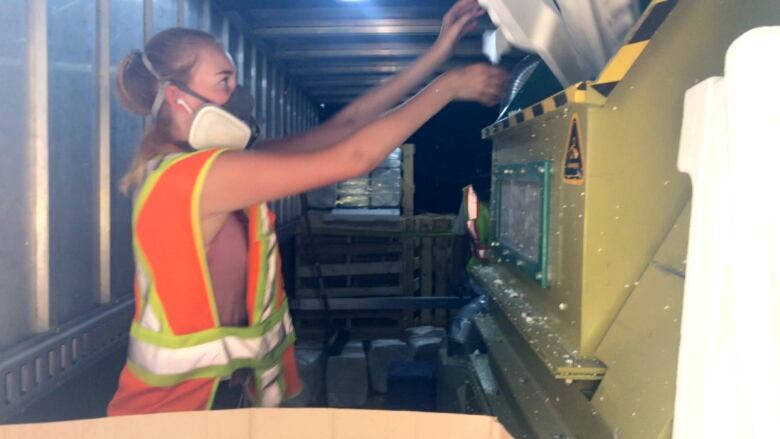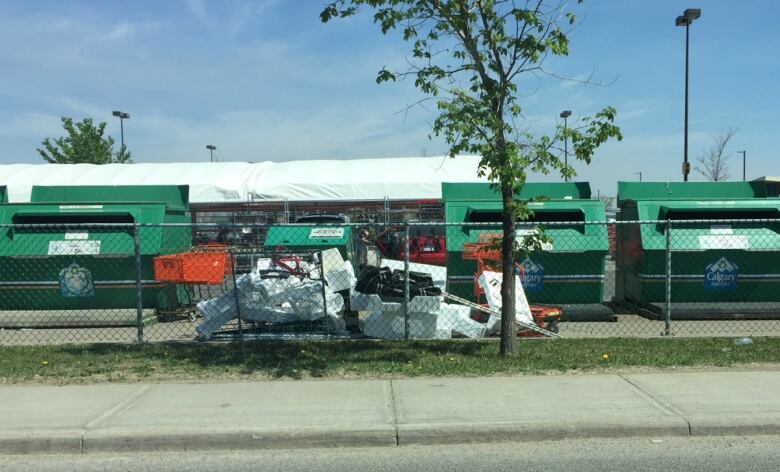Why Calgarians won't see Styrofoam blue bin recycling despite local innovation's success
North America's only mobile-Styrofoam recycling company says business is booming, but not in its home city

Reduce, Reuse and Rethinkis aCBCNews series about recycling. We're exploring why our communities are at a turning point and exploring ways to recycle better. You can be part of the conversation by joiningour Facebook group.
Recycled Styrofoam oozes out of a compressor.
It'spart of an innovative fleet of mobile trucks created by Calgary-based Styro-Go, which bills itself asthe only mobile-Styrofoamrecycling company in North America.
Owner Robert Herrittsays his company is picking upcontracts with governments and companies across North America includingthe B.C. government, City of Toronto, appliance firms and even a national pilot project forLowe's Canada but it's having trouble convincing the City of Calgary.
"It's interesting where the demand and acceptance and willingness to engage our service is very high everywhere else except where we live. So it's one of life's little ironies I guess," he said.

Some of the biggest demand is coming from south of the border. Herritt expects his company will go from processing 40tonnes a month to possibly more than 250tonnes this September. He says that's theequivalent of 27 school buses not going tothe landfill, rising to 150 busesby September.
"This is a product that actually can be recycled, and should be recycled," he said. "So there is a greateracceptance on the public side to participate in recycling programs both from residential but also commercial and industrial players."
Herritt says it's become popular to be green, especially for big companies.
"That's just one more check mark they can tell the public, or their customers, that they recycle all thingsincluding Styrofoam," he said.
Mobile trucks
Styro-Gohas patents on their innovative trucks, which are made in Lethbridge. The company has been in operation for the last two years, but was intentionally flying under the radar as they get set up, and is "really starting to hit their stride." Herrittsays they've had to turn down requestsbecause every mobile truck they own is fully booked.
It all started when Herritt noticed bins of Styrofoam, used for home insulation, being thrown out by construction companies.
But Herrittsaid the challenge was to make it economically feasible. The mobile fleet allows for that, with a compressor inside, condensing a trailer load of Styrofoam down to the size of a fridge in easy cubes for transport.

"To win companies over we had to almost be comparable to regular waste management [on the pricing side]," saidHerritt.
"By recycling their Styrofoam they've seen their garbage bills go down because Styrofoam actually takes up quite a bit of volume."
Blue bin problems
So why doesn't the City of Calgary jump on board? The answer is cost.
The city saysrecycling Styrofoam isexpensive, and only accounts for one per cent of materials heading to the landfill. It causes other problemstoo.
"We do not accept No. 6 foam, so please don't put these in the blue carts because it will break into small pieces and contaminate the other recyclables," said Calgary's recycling spokesperson Sharon Howland.

But that hasn't stopped it from showing up in blue bin pickup. Howland says Calgary accepts plastic containers with recycling number one to seven, but not foam even if it has a recycling number six on it.
"It creates a bit of confusion," she said, adding the city has awebsite to check products if there are any doubts about what goes in a blue bin.
Howlandsays the city would prefer the product not be used at all, but says people should vote with their money and not support businesses that use Styrofoam instead of something that is recyclable or compostable.
Provincial pickup?
She says it needs a separate pickup system, and would like to see a new funding model from the province or what's called an extended producer responsibility program.
"What that does is put the financial responsibility for recycling programs onto the manufacturers of products, then they have to pay for the infrastructure to put in a drop-off depot model," said Howland.
"In B.C. we see that, they have depots across the province where they accept this type ofmaterial, but that's because it is funded by the producers of the product."
It's something the Government of Alberta isconsidering, according to Alberta Environment spokesperson Scott Lundy.
But the Recycling Council of Albertawhich works with the province topromote and facilitate waste reduction, recyclingand resource conservationdoesn't expect that to happen before the next election.
Executive director ChristinaSeidelsays right now it's tough to find markets for other recyclables, so many municipalities don't want to take the additional step of adding another material.
The Town of Cochrane just west of Calgary, however, says Styrofoam is one of its most consistent sellers. Cochraneset up Styrofoam recycling for their residents in 2009 after buying a compressor. They have to turn away people who don't live in the community because there is so much interest.
Styro-Gohas even bought compressed Styrofoamfrom the municipality in the past. Cochrane'sEco Centre takes most types of foam and expanded polystyrene, as long as it's clean of residue and has no tape or labels.
Future of Styrofoam recyclingis friendly
Herritt says Styrofoam is where cardboard was 20 years ago, so everything has to be clean and sorted into separate colours before it can be recycled.
That means dirty takeout containers which are oftencontaminated with food or oils can't be recycled. But there are many other ways Styrofoam is used:packing material, meat traysand evenmattresses (which are currently not accepted through most recyclers).
It's not a closed-loop system where recycled product would be turned back into Styrofoam although Herritt sayswork is underway by a Canadian company to make that a reality.
The plastic product can be remade into a variety of new items, like faux brushed nickel, marble orwood products. Herritt says it can helps savetrees while beingresistant to mould and mildew.

He says recycling the plastic product is muchbetter than sending it to the dump where it will never decompose. TheEnvironmental Protection Agency in the United States estimates roughly threeper cent of Styrofoam is actually being recycled right now, Herrit added.
Another problem is that Styrofoam is mostly air, meaning it's so light.
"Styrofoam has a secondary pollution value in that because it is so light ... if it's windy, it can be picked up and travel quite far outside the boundaries of the landfill," said Herritt.
Herritt says dealing with Styrofoam is crucial asmore people ask their municipalities to give them better recycling options.
"Over the past few years, the cities have been really pushing to make a difference," he said. "Now organics is very mainstream. If you don't recycle organics you are very 10 years ago, so hopefully we are leading that trend where in 10 years time if you don't recycle Styrofoam you are so 2018."
- MORE CALGARY NEWS |LNG: Why these 3 letters and $40B could change the course of Canada's energy sector
- MORE ALBERTANEWS |Cardston doctor under fire for alleged racist confrontation with Indigenous people
- Read more articles byCBC Calgary, like us onFacebookfor updates and subscribe to ourCBC Calgary newsletterfor the day's news at a glance.
Corrections
- An earlier version of this story said Styro-Go's production was 40,000 tons, rising to possibly 250,000 tons. In fact, it is roughly 40 tonnes a month rising to 250 tonnes in September.Aug 14, 2018 9:57 AM MT












_(720p).jpg)


 OFFICIAL HD MUSIC VIDEO.jpg)
.jpg)



























































































